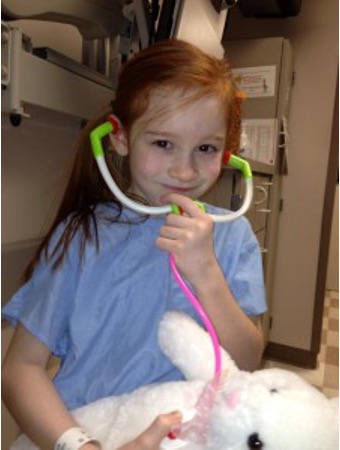Emma Sinn

My beautiful daughter Emma was diagnosed with RRP at the age of 5½.
She very suddenly became hoarse and we could not get her voice cleared up. Her family doctor kept insisting that I just needed to give the steroid more time to work, but after 3 weeks and her voice only getting worse, I knew in my heart something was not right. I started to research hoarseness in children online. I found that one of the most common causes of persistent hoarseness in children is RRP. I knew right away that that was exactly what my daughter had. I had just been diagnosed with cervical HPV causing cervical dysplasia about 1½ years after Emma’s birth, so I knew my suspicions were most likely correct.
I took it upon myself to set up an appointment with a pediatric ENT for my daughter. I told him of my own HPV history and told him that I was positive my daughter had RRP. He passed a scope down her nose that same day and confirmed that Emma had something growing on her vocal cords. He said that she would have to have surgery so that he could get a better look and biopsy the area. My heart sank because I already knew. It was confirmed that Emma had RRP on October 20th, 2011. This is easily the worst day of my life. The doctor proceeded to confirm the diagnosis in a public waiting room where I completely fell to my knees and could not be consoled. I was led out of the waiting room by my mom and Husband to a bathroom where I collapsed to the floor and cried. After several minutes of uncontrollable crying, I pulled it together because I promised my little girl I would be there when she woke up.
Today, Emma is 7 years old and she has had two surgeries. Unfortunately, both surgeries have involved the most sensitive area of her vocal cords (anterior commissure) and have left her with very limited and altered vocal ability. I have not heard my daughter laugh since before her second surgery 3½ months ago. She is physically unable. If you were not looking at her face, you would not know she is laughing. It absolutely breaks my heart. My daughter used to love to sing. Now she is physically unable to sing. Not only because she barely has any vocal range, but because she is embarrassed at how awful her voice sounds. She used to love to readout loud to me, but now it is just a struggle for her. This is just the tip of the iceberg when it comes to ways my daughter’s quality of life has been affected.
I’m frustrated because I don’t know what to do for her. It is so hard to find a surgeon that even knows much about RRP or who has ever had an RRP patient. We realize that Emma is very lucky at this point because she is considered to have mild disease. We just keep holding on to the hope that a cure will be found. We take it one day at a time. Every morning I wake up, I pray it was all just a nightmare, but reality sets in again and again. We have learned to cope, but the pain of watching my daughter go through this is always there. I find myself analyzing every word that comes out of her mouth. Constantly, I am paranoid. Does her voice sound worse today? Is her breathing ok? Will she eventually lose her voice completely? Will it spread to her lungs and become fatal? And I could go on and on. For now, we just try to give Emma the best, most loving, and most normal life possible between surgery.”
-Kate Sinn, mother of RRP patient Emma Sinn


